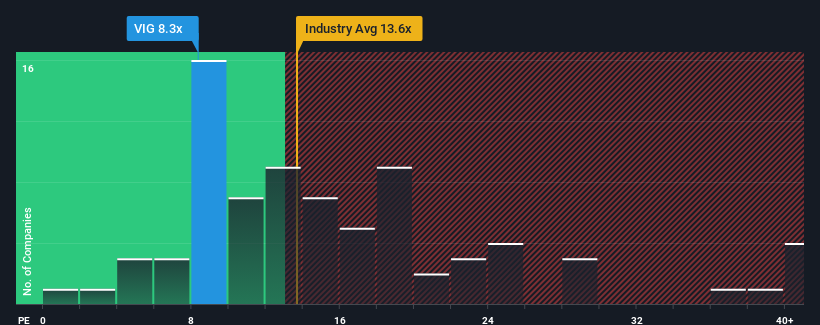Investors Aren't Buying Vienna Insurance Group AG's (VIE:VIG) Earnings

When close to half the companies in Austria have price-to-earnings ratios (or "P/E's") above 14x, you may consider Vienna Insurance Group AG (VIE:VIG) as an attractive investment with its 8.3x P/E ratio. Although, it's not wise to just take the P/E at face value as there may be an explanation why it's limited.
Our free stock report includes 1 warning sign investors should be aware of before investing in Vienna Insurance Group. Read for free now.With earnings growth that's superior to most other companies of late, Vienna Insurance Group has been doing relatively well. It might be that many expect the strong earnings performance to degrade substantially, which has repressed the P/E. If not, then existing shareholders have reason to be quite optimistic about the future direction of the share price.
View our latest analysis for Vienna Insurance Group

Is There Any Growth For Vienna Insurance Group?
The only time you'd be truly comfortable seeing a P/E as low as Vienna Insurance Group's is when the company's growth is on track to lag the market.
Retrospectively, the last year delivered an exceptional 16% gain to the company's bottom line. The latest three year period has also seen an excellent 70% overall rise in EPS, aided by its short-term performance. Accordingly, shareholders would have probably welcomed those medium-term rates of earnings growth.
Shifting to the future, estimates from the four analysts covering the company suggest earnings should grow by 7.8% per year over the next three years. Meanwhile, the rest of the market is forecast to expand by 12% per year, which is noticeably more attractive.
In light of this, it's understandable that Vienna Insurance Group's P/E sits below the majority of other companies. Apparently many shareholders weren't comfortable holding on while the company is potentially eyeing a less prosperous future.
The Bottom Line On Vienna Insurance Group's P/E
We'd say the price-to-earnings ratio's power isn't primarily as a valuation instrument but rather to gauge current investor sentiment and future expectations.
As we suspected, our examination of Vienna Insurance Group's analyst forecasts revealed that its inferior earnings outlook is contributing to its low P/E. At this stage investors feel the potential for an improvement in earnings isn't great enough to justify a higher P/E ratio. Unless these conditions improve, they will continue to form a barrier for the share price around these levels.
Before you settle on your opinion, we've discovered 1 warning sign for Vienna Insurance Group that you should be aware of.
You might be able to find a better investment than Vienna Insurance Group. If you want a selection of possible candidates, check out this free list of interesting companies that trade on a low P/E (but have proven they can grow earnings).
New: Manage All Your Stock Portfolios in One Place
We've created the ultimate portfolio companion for stock investors, and it's free.
• Connect an unlimited number of Portfolios and see your total in one currency
• Be alerted to new Warning Signs or Risks via email or mobile
• Track the Fair Value of your stocks
Have feedback on this article? Concerned about the content? Get in touch with us directly. Alternatively, email editorial-team (at) simplywallst.com.
This article by Simply Wall St is general in nature. We provide commentary based on historical data and analyst forecasts only using an unbiased methodology and our articles are not intended to be financial advice. It does not constitute a recommendation to buy or sell any stock, and does not take account of your objectives, or your financial situation. We aim to bring you long-term focused analysis driven by fundamental data. Note that our analysis may not factor in the latest price-sensitive company announcements or qualitative material. Simply Wall St has no position in any stocks mentioned.
About WBAG:VIG
Vienna Insurance Group
Engages in providing insurance products and services in Austria and internationally.
Undervalued with proven track record.
Similar Companies
Market Insights
Community Narratives



